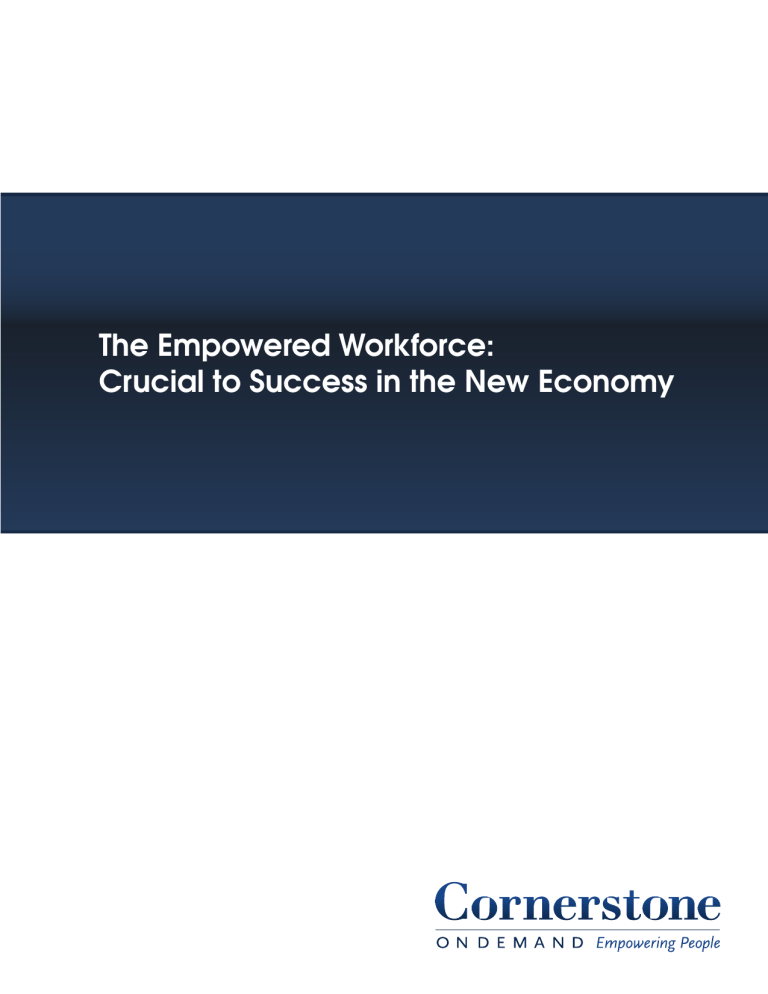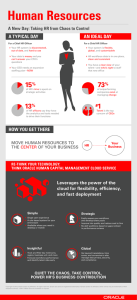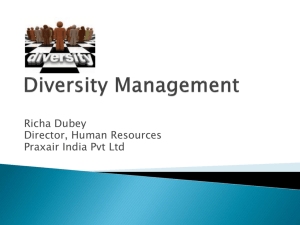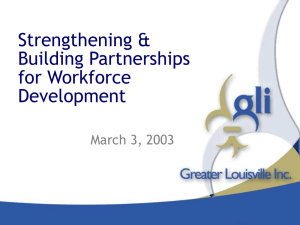
The Empowered Workforce: Crucial to Success in the New Economy The Empowered Workforce: Crucial to Success in the New Economy Introduction Organizations that have not only survived but thrived during the recession have focused with a laser-like intensity on the execution, productivity and performance of the business. But homing in on traditional business results has also escalated demands of the workforce. Staff cuts, tighter budgets and increasingly difficult workloads have created an environment in which employees are feeling overworked, undervalued and disengaged. So, while a focus on business results may have served organizations well in the short term, it won’t be enough to keep them ahead of the competition moving forward. According to research from Towers Watson, a majority of employers believe that talent retention will be more difficult in 2011.1 All employees – and top performers in particular – will need a deeper reason to stay when the economy recovers and it again becomes an “employee market”. They will need to feel they are appreciated for their contributions, have the resources to do their jobs to the best of their abilities, and have clearly defined opportunities to develop and advance within the organization. In short, they must be empowered beyond being asked to meet performance goals. Why does having an empowered workforce matter for an organization? Empowered employees are more engaged – resulting in better retention and a higher quality of customer service. Empowered people also are more motivated, leading to better performance and higher productivity. An empowered workforce is better aligned with an organization’s business objectives, allowing companies to be smarter and more agile in an ever-shifting business landscape. Companies seeking to avoid excessive turnover and stay competitive as the economy recovers need to close the empowerment gap. If not, it could be costly to the business in more ways than one: in addition to lost skills and business intelligence, turnover costs can run anywhere from 25 percent to 250 percent of a position’s annual salary, according to the American Management Association and other sources. This paper explores the notion of empowerment – what it means for the employee, why it matters for the bottom line, and how organizations can leverage their learning and talent management strategies to foster an empowered organization. It also offers a case study of how Kelly Services, the global workforce management firm, applied leading-edge learning and talent management technology and strategies to enhance career development and job performance for employees in 32 countries. 1 Towers Watson, 2010 Global Workforce Study. 1 The Empowered Workforce: Crucial to Success in the New Economy The Empowered Workforce: Engaged, Motivated, Aligned Survival over the past couple years required many organizations to take extraordinary measures to control costs, and research shows that employee engagement and morale has suffered as a result. According to a survey conducted by Kelton Research on behalf of Cornerstone OnDemand, employers are not empowering their people with the right training, performance feedback or insight into business objectives. Conducted in March 2010, the study revealed that in the previous six months: • 68 percent of employed Americans said they hadn’t received useful feedback from their supervisors. • 82 percent had not established career goals with their supervisors. • 53 percent didn’t feel they had a clear understanding of how their role contributed to company objectives. • And 25 percent had been given new duties or responsibilities at work that were outside of their primary skill set.2 “From my experience, an un-empowered workforce is more likely to operate in a slow, hierarchical decision-making manner that ultimately affects customer service and the success and profitability of the business,” said Nina Ramsey, senior vice president of global human resources for Kelly Services. “It is important that employees feel connected to the company strategy, their role, their leaders and their team in order to secure their willingness to give discretionary effort and commitment to stay with the company.” Empowering employees also has taken on even more importance as companies face the challenge of motivating and retaining a younger generation of workers, for whom mobility is the name of the game. Even before the recession hit, fewer than half of all Gen Y workers planned to stay one to five years at their current jobs, and only 22 percent expected to stay six years or more.3 2 Cornerstone On Demand, Employee Attitude Survey, 2010, www.cornerstoneondemand.com. 3 Robert Half International, 2007, What Millennial Workers Want: How to Attract and Retain Gen Y Employees. 2 The Empowered Workforce: Crucial to Success in the New Economy Defining the Empowered Employee Empowered employees are engaged employees. They have all of the tools they need to learn and grow, connect with colleagues and others throughout the company, make their own decisions, be leaders and contribute to the success of the business. Put another way, empowerment is a key driver of engagement. Several of the 12 “elements of great managing,” as determined by the Gallup Organization, are directly related to employee empowerment. Empowered employees share the following attitudes toward their jobs, according to the Gallup research: • I have the materials and equipment I need to do my work right. • I have the opportunity to do what I do best every day. • There is someone at work who encourages my development. • At work, my opinions seem to count. • The mission or purpose of my company makes me feel my job is important. • In the last six months, someone at work has talked to me about my progress. • This last year, I have had opportunities at work to learn and grow.4 Empowerment can be viewed as a key performance indicator for the health and wellness of an organization’s people strategy. Areas of talent management that include learning and development, performance management, succession planning and career management all can be used to promote a culture of empowerment. “Whether it is training, career development or aligning performance goals with business strategy, we want to foster an environment at Kelly Services where our people feel included in the decisionmaking that affects their daily lives,” Ramsey said. “We also want our employees to see how they contribute to the overall success of the company.” 4 Wagner, Rodd and James K. Harter, 2006, PhD, 12: The Elements of Great Managing, New York: Gallup Press. 3 The Empowered Workforce: Crucial to Success in the New Economy The Business Benefits of Empowerment Organizations that want to stay ahead of the competition need to respond to a fundamental shift in the American workforce since the recession took hold: Employees are far more focused today on the ability to control their work situation. From the end of 2008 to the end of 2009, empowerment nearly doubled as a top driver for employees, according to Towers Watson.3 Having an empowered workforce should be a priority for organizational leaders for the following reasons: • An empowered workforce is more engaged. Engaged employees drive higher customer satisfaction and boost the bottom line. The Gallup Organization reports that companies with higher-thanaverage employee engagement also had 27 percent higher profits, 50 percent higher sales and 50 percent higher customer loyalty.4 Engaged employees also result in a higher retention rate. In turn, this gives an organization a larger talent pool and as a result, more and better options for succession planning – an increasingly important factor for success as the economy improves. • An empowered workforce is higher performing and more productive. When people are empowered, they are more engaged – translating to higher levels of productivity and increased revenue. Research by the Forum for People Performance Management & Measurement found that organizations with engaged employees have customers who use their products more, which leads to higher customer satisfaction levels.5 • And an empowered workforce is more aligned with an organization’s business goals. Empowered employees are in sync with the overall goals of the business. Alignment means they have the right skills, knowledge and expertise required to support current and future initiatives – contributing to greater talent readiness and succession planning. Alignment also helps management gain better business intelligence and insight regarding the workforce – allowing them to make smarter business decisions and be more agile among shifting business conditions. 5 Towers Watson, 2010 Global Workforce Study. 6 Crabtree, S., January 13, 2005, Engagement Keeps the Doctor Away. Gallup Management Journal. 7 Forum for People Performance Management & Measurement, undated, Linking Organizational Characteristics to Employee Attitudes and Behavior – A Look at the Downstream Effects of Market Response & Financial Performance. 4 The Empowered Workforce: Crucial to Success in the New Economy The bottom line is that empowered employees, managers and leaders reduce costs, boost revenue and create a stronger organization. According to Bersin & Associates, companies that empower their employees via comprehensive talent management strategies: • Achieve 26 percent higher revenue per employee. • Become 109 percent more capable of retaining high performers. • Are 92 percent better at responding to economic conditions. • Are 144 percent better at planning for future talent needs. Fostering an Empowered Workforce Promoting a culture of empowerment first and foremost requires support and buy-in from the top down. Without executive support, leaders will not embrace empowerment as a management priority. And if it isn’t a business charge for leaders, empowerment becomes a hollow promise for the employee. Ideally, empowerment is not a separate initiative but instead becomes part of the company’s culture and an objective of its HR initiatives. It also requires knowing where the empowerment gaps are in your organization – conducting employee and management surveys to benchmark where you are today and identify areas for improvement. With this intelligence, learning and HR leaders are better able to enhance their existing learning and talent strategies and create tailored and targeted initiatives for fostering employee empowerment. This includes programs in the areas of learning and development, employee performance management, succession planning and career development, and enterprise social networking. Technology plays a key role in enabling an empowered workforce. Solutions should be userfriendly and easily accessible for the employee and manager. Tools also should be self-service, enabling employees to play a more proactive role in their professional development and performance management. For the organization, the value is in the intelligence and insight collected through the system to evaluate the workforce and make more informed decisions about the business. 5 The Empowered Workforce: Crucial to Success in the New Economy Using Learning and Talent Management To Build an Empowered Organization One overarching reason that an integrated, tailored and accessible learning and talent management system can bring measureable gains in empowerment and engagement is because it can influence any or all of the “engageable moments” in the employee-employer life cycle. These key moments occur during onboarding, goal setting and performance feedback, career discussions, senior leadership communications and other employee-manager interactions.6 Learning management can boost empowerment if it delivers targeted training and development that enables an employee to perform their role to the best of their abilities. Providing employees with easy access throughout the workforce lifecycle – from onboarding and ongoing training, to career and leadership development – and allows people to continuously grow and access skills for advancing their career within and driving the goals of the organization. This can include classroom training, online learning and informal learning via social networking and collaboration tools. “With our onboarding initiatives, we focus on allowing new employees to fully understand the company and culture they’re joining – our rich history, our character, our mission and our client value proposition,” Kelly Services’ Ramsey said. “It’s really the beginning of getting people connected to their leaders, because the leader also is very involved in the onboarding process and their ongoing development.” 8 Watson Wyatt, Driving Business Results Through Continuous Engagement, 2008/2009 WorkUSA Survey Report. 6 The Empowered Workforce: Crucial to Success in the New Economy Performance management and reviews can directly heighten empowerment because they align individual goals with department objectives and organizational strategy, giving the employee direct insight into how their performance links to business results. Automating the performance management process via technology also enables managers to have more meaningful – and more frequent – discussions with their direct reports, versus making performance management an annual event. When integrated with learning and development, training can be assigned to address skill gaps identified during the review process, helping an employee to improve his or her performance or acquire skills needed to support new business initiatives or career aspirations. More sophisticated performance management technology solutions can allow organizations to track and report on goal alignment across the organization and draw correlations with the performance of the business. Today’s succession planning and career management solutions allow organizations to expand succession initiatives beyond the top executive positions and include people at every level of the organization. Self-service career management tools make it easier for employees to take control of their career paths within a company, giving them the means to market their professional experience and areas of interest. They are also able to gain a clearer view of their career path with the company – and identify what skills and expertise they need to acquire in order to advance into new roles. “We were pleasantly surprised by the level of employee participation in creating online career profiles,” Ramsey said. “Creation of the profiles was voluntary, and we had 72 percent participation in our first run. This was a clear indicator of the interest people have in managing their careers and in other opportunities with our company.” In addition to enabling career management and encouraging talent mobility, succession management tools for organizational charting, talent pooling and other managerial functions boost empowerment for managers and leaders to plan ahead based on available talent and the needs of the organization – including roles that can be recruited from within versus external recruiting. 7 The Empowered Workforce: Crucial to Success in the New Economy Enterprise social networking tools help to formalize and capture natural interactions that occur in the workplace – whether it is enabling mentoring and coaching as part of a training program, allowing employees to access just-in-time information, or building expertise that helps them to perform in their role and make faster decisions. Internal social networks also give employees a forum for sharing their ideas, helping to drive innovation in the organization, and allowing them to feel connected to all levels of the company – and in most instances, across a geographically dispersed workforce. With these types of tools in place, the organization is able to capture valuable corporate knowledge in a central system that is searchable and accessible anytime, anywhere. And it can identify the most active and knowledgeable community participants who may be in a critical role that was previously overlooked or undervalued, or who may be a strong candidate for other roles in the organization. 8 The Empowered Workforce: Crucial to Success in the New Economy Summary Empowerment may not be on everyone’s list of organizational priorities today, but it should be if companies want to retain their top talent and stay competitive as the market recovers. Closing the empowerment gap results in a more engaged, productive and aligned workforce and can have a positive impact on everything from the quality of customer service and employee retention to talent readiness and driving the goals of the business. While gaining executive buy-in and assessing the state of empowerment in your organization is important for determining how to enhance your existing learning and talent initiatives, having the right technology in place to provide employees with easy-to-use, self-service tools is essential to helping organizations foster a culture of empowerment. 9 The Empowered Workforce: Crucial to Success in the New Economy A Case Study: Creating a High-Engagement Culture at Kelly Services For the past three years, global workforce management services leader Kelly Services has been laser-focused on aligning its learning and talent management strategies with the overall goals of the business. Core to this approach was a strategic commitment to creating a high-engagement culture among its full-time employees around the world. “Ultimately, every company wants employees who are engaged in their work and empowered to succeed in their roles. This is particularly important in the service industry, where people deal with customers directly every day,” said Nina Ramsey, senior vice president of global human resources for Kelly Services. “Our customers want to work with front-line people who are fully capable of meeting their needs and are committed to delivering excellent service. It's Kelly's job to prepare our employees and ensure they are equipped to make key decisions that will help create loyal customers and, in turn, impact the success and profitability of our company.” To support this effort, Kelly’s HR team knew it needed to help people grow and develop throughout their careers. They also wanted the ability to identify those roles that have a differential impact on the company – pivotal, revenue-producing roles – and ensure Kelly had the right pipeline of talent for these positions. Key to the company’s success was designing learning and talent processes that involved the employee taking a more proactive role in their own career development and performance management. Rather than taking a top-down, paternalistic approach, the new processes would be more employee-centric – with practices designed to be convenient, interactive and self-service. Technology allowed Kelly Services to bring these practices to life, creating an integrated, online experience that included solutions for new employee onboarding, learning and development, performance management, succession planning and career management. “Cornerstone’s Career Profile feature has really opened the door in helping us directly engage with employees and understand what is important to them,” Ramsey said. “People want a voice in their careers, and we’re encouraging them to have one. Technology helps us to foster this dialogue and enables the process, but it is essential that the processes and practices are right to begin with.” According to Ramsey, equally important to the success of these efforts is having the right leaders in place. “If we want to be an employer of choice, we need to have leaders of choice. That's why we also hold our leaders accountable for developing their people." With the new process and technology support in place, Kelly has been able to make significant progress with its efforts. 10 The Empowered Workforce: Crucial to Success in the New Economy • Onboarding: Kelly has created an extensive onboarding program that has helped to decrease time to productivity for new employees by 27-50 percent and reduce turnover. • Learning and Development: Kelly’s online learning center gives employees anytime, anywhere access to classroom and online training and development opportunities. The company also has a competency model for all levels, and it links to Kelly's learning center to help employees better identify relevant courses. • Performance Management: The company has redesigned its performance management processes to better align with learning and development - encouraging more active and meaningful discussions between employees and managers about career development needs and interests. A one-page, concise overview of the company’s strategic business plan also helps employees align their individual goals to the company’s objectives and see the connection between their day-to-day efforts and Kelly’s overall success. • Succession Planning: Kelly’s Talent Advisory Board and Leadership Blueprint are helping to ensure Kelly is building the right bench strength for the company’s current and future business needs. The company also conducts annual talent summits to focus on the top 200 leaders in the company, reviewing talent and development needs and identifying potential successors. Kelly already has plans to cascade this process further into the organization. • Pivotal Roles: The company is taking a targeted approach to identifying and maximizing its pivotal, revenue-generating talent. This includes honing in on what’s required for these roles based on customer needs, as well as determining how best to creatively build, reward and retain the right talent. • Career Opportunities: To offer better growth and promotional opportunities for its people, as well as ensure the company has a rich pool of talent to draw from, Kelly is now offering online career management tools. Employees create their own career profiles, highlighting resume information and career interests, such as aspirational roles or willingness to relocate. The company also is developing career maps for every role across the company for improved transparency regarding career paths. 11 The Empowered Workforce: Crucial to Success in the New Economy Beyond its talent initiatives, Kelly is fostering the spirit of employee empowerment in its organizational culture, placing an intentional focus on executive messaging that shares the strategic direction of the company, the expectations of its leaders and the progress that is being made against the strategy. They also have made a greater effort to acknowledge and celebrate company successes. And, Kelly’s HR team conducts annual “engagement surveys” to track its progress, sharing results with employees and creating action plans to continuously improve on its efforts. Commented Ramsey, “When I think of empowerment, I think of an organization that communicates a clear vision and then ensures that each employee receives the right support and understands how they contribute to their own - and the organization's - success." About Cornerstone OnDemand Cornerstone OnDemand is a global provider of comprehensive learning and talent management software and services. Our solution is designed to help organizations empower their people and maximize the productivity of their workforce. To learn more, visit www.cornerstoneondemand.com. © 2010 Cornerstone OnDemand, Inc. All Rights Reserved. www.csod.com | p +1(310) 752-0200 | f +1(310) 752-0199 12





